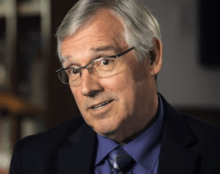Brian M. Hauglid
Brian M. Hauglid (Born 1954) is an associate professor of ancient scripture at Brigham Young University (BYU). From 2014 to 2017, he was the editor-in-chief of the Journal of Book of Mormon Studies and currently serves as director of the Laura F. Willes Center for Book of Mormon Studies, a part of BYU's Neal A. Maxwell Institute.

Life and career
Hauglid was raised in the suburbs of Minneapolis, Minnesota. He was raised as a Catholic. He was baptized a member of The Church of Jesus Christ of Latter-day Saints in 1976 (LDS Church). He served a mission for the LDS Church in the California Sacramento Mission.
Hauglid has a bachelor's degree in Near Eastern Studies from BYU. He received a PhD from the University of Utah in Arabic and Islamic studies in 1998.
In 1999, he joined the BYU faculty. In addition to his work with the Journal of Book of Mormon Studies and the Willes Center he has been on the editorial advisory board for the Easter Christian Text Series of BYU's Middle Eastern Texts Initiative. He was also a co-editor of the Maxwell Institute's Studies of the Bible and Antiquity. He co-edited the Studies in the Book of Abraham Series with John Gee.
Hauglid is a member of the academic advisory board of the Intermountain West Journal of Religious Studies.
Hauglid has served in multiple positions in the LDS Church, including as a bishop.
Hauglid has published extensively studies on the Book of Abraham. He is currently working on a project entitled Mummies, Manuscripts, and Making Scriptures: The History and Controversies of the Pearl of Great Price with Terryl L. Givens.[1] Some of his work was cited in the LDS Church's Gospel Topics essay on the Translation and Historicity of the Book of Abraham.[2]
Renouncement of apologetic past
In a post on Dan Vogel's facebook page in 2018, Hauglid publicly renounced his former beliefs that the Book of Abraham came from a missing section of a scroll and criticized the scholarship of colleagues Gee and Kerry Muhlestein:
For the record, I no longer hold the views that have been quoted from my 2010 book in these videos. I have moved on from my days as an "outrageous" apologist. In fact, I'm no longer interested or involved in apologetics in any way. I wholeheartedly agree with Dan's excellent assessment of the Abraham/Egyptian documents in these videos. I now reject a missing Abraham manuscript. I agree that two of the Abraham manuscripts were simultaneously dictated. I agree that the Egyptian papers were used to produce the BoA. I agree that only Abr. 1:1-2:18 were produced in 1835 and that Abr. 2:19-5:21 were produced in Nauvoo. And on and on. I no longer agree with Gee or Mulhestein. I find their apologetic "scholarship" on the BoA abhorrent. One can find that I've changed my mind in my recent and forthcoming publications. The most recent JSP Revelations and Translation vol. 4, The Book of Abraham and Related Manuscripts (now on the shelves) is much more open to Dan's thinking on the origin of the Book of Abraham. My friend Brent Metcalfe can attest to my transformative journey.[3]
Publications
As co-editor
- Traditions of the Early Life of Abraham with John Gee and John Tvedtnes
- Astronomy, Papyrus, and Covenant with John Gee
- Revelations and Translations, Volume 4: Book of Abraham and Related Manuscripts. Facsimile edition. Vol. 4 of the Revelations and Translations series of The Joseph Smith Papers with Robin Scott Jensen
Book chapters
- Hauglid, Brian M. "On the Early Life of Abraham: Biblical and Qur’ānic Intertextuality and the Anticipation of Muḥammad." in John C. Reeves, ed., Bible and Qur’ān: Essays in Scriptural Intertextuality (Boston: Brill, 2004): p. 87-105.